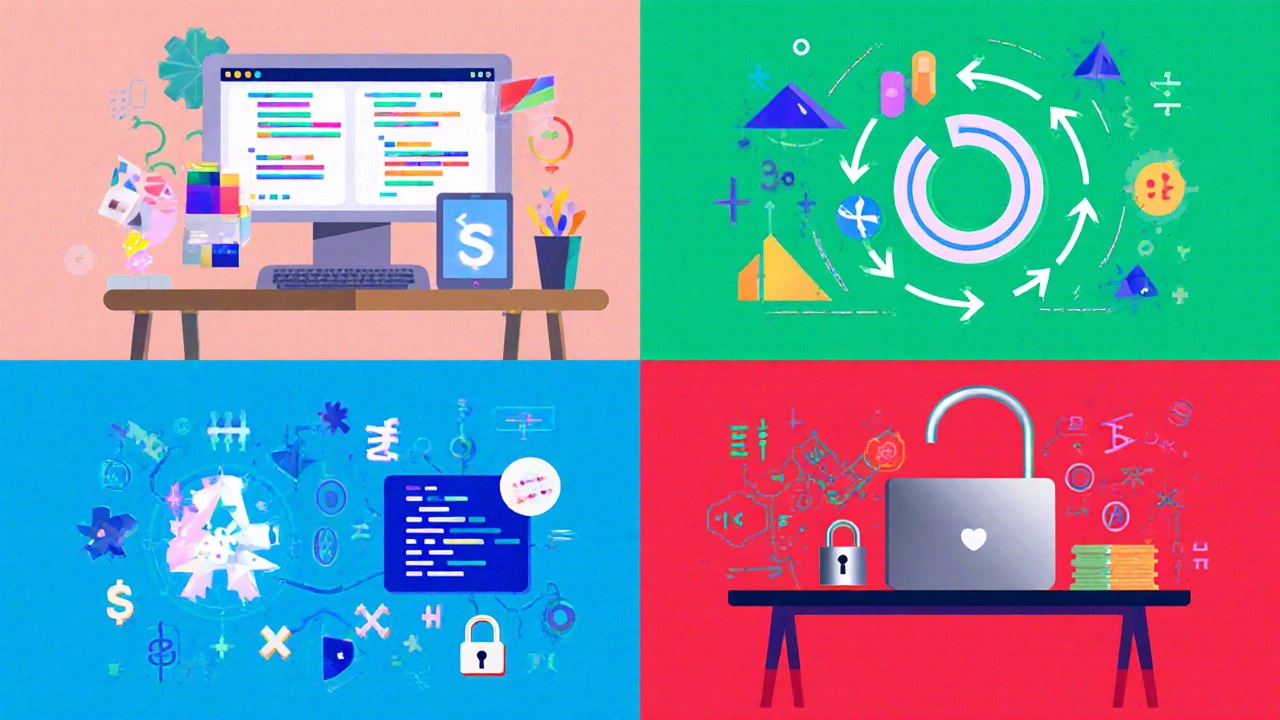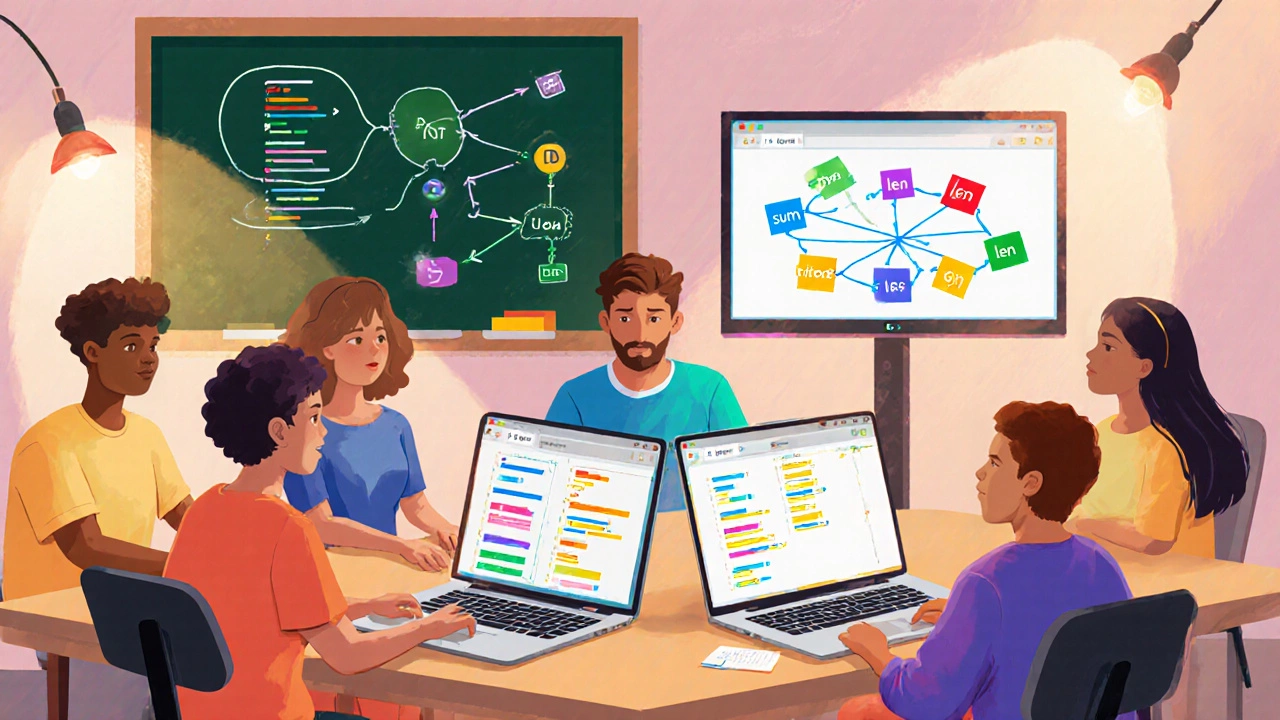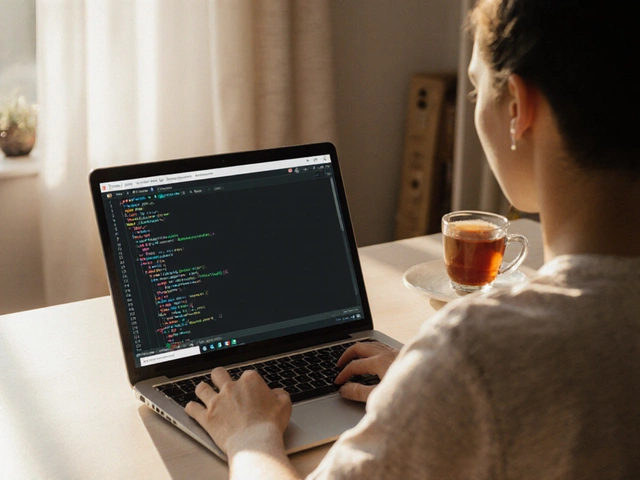Coding Math Requirements Calculator
Estimate the math requirements for your programming domain. Select your area of interest to see what concepts you'll need to learn.
Ever heard someone say, “You can’t be a programmer without being good at math”? It’s a common line, but the truth is a lot more nuanced. In this article we’ll break down what programming actually asks of you, where math matters, and how to learn to code even if you’re not a numbers person.
Key Takeaways
- Most everyday coding tasks need basic logical thinking, not advanced mathematics.
- Specialized fields like data science, graphics, or cryptography demand deeper math knowledge.
- You can start building functional apps with only elementary arithmetic and algebra.
- Learning the right math concepts alongside coding accelerates problem‑solving skills.
- Targeted resources let you pick up necessary math without getting overwhelmed.
What coding is
Coding, also called programming, is the process of writing instructions that a computer can execute. It’s essentially a conversation between you and the machine, using a language the computer understands. Whether you’re stitching together a web page, automating a spreadsheet, or building a game, you’re turning ideas into code.
Why the Math Myth Persists
Many people assume a strong link between mathematics and programming because the two share logical structures. In school, math classes teach you to follow precise steps to solve problems-very similar to writing an algorithm. This overlap creates the impression that if you’re weak in math, you’ll stumble in coding.
Another driver is media hype. Stories about AI breakthroughs, graphics rendering, or cryptographic security often cite complex formulas, reinforcing the idea that every programmer needs a PhD in math.

Math Intensity Across Programming Domains
| Domain | Typical Math Required | Key Math Topics |
|---|---|---|
| Web Development (HTML/CSS/JS) | Low | Basic arithmetic, logical operators |
| Mobile App Development | Low‑Medium | Coordinate geometry for UI layout, simple statistics |
| Game Development | Medium‑High | Vectors, trigonometry, linear algebra |
| Data Science & Machine Learning | High | Statistics, probability, linear algebra, calculus |
| Embedded Systems / IoT | Medium | Binary arithmetic, discrete math |
| Cryptography | High | Number theory, modular arithmetic |
Notice that the majority of entry‑level work-like building websites or simple utilities-falls into the low category. Even within higher‑intensity fields, you often start with the basics and learn deeper concepts as you progress.
Core Math Concepts That Help Most Coders
- Algorithmic thinking: Understanding step‑by‑step problem breakdown. No calculus needed, just clear sequencing.
- Discrete mathematics: Sets, logic, and combinatorics form the backbone of data structures and complexity analysis.
- Linear algebra (vectors, matrices): Vital for graphics, simulations, and machine‑learning models.
- Statistics & probability: Central to data cleaning, A/B testing, and predictive algorithms.
- Number theory: Mostly appears in security‑related code, such as encryption.
You don’t need to master all of these up front. Pick the ones that align with the type of projects you want to build.
How to Start Coding Without Heavy Math
- Choose a beginner‑friendly language. Python is popular because its syntax mirrors plain English and its standard library handles many numeric tasks for you.
- Follow a project‑based tutorial. Building a simple to‑do list app or a personal blog teaches you loops, conditionals, and data storage without requiring advanced formulas.
- Leverage built‑in functions. Functions like
sum(),len(), ormax()perform calculations so you can focus on logic. - Use visual coding tools. Platforms like Scratch or Blockly let you drag‑and‑drop blocks that represent logical statements, reinforcing programming concepts without writing equations.
- Ask for help early. Communities on Stack Overflow, Reddit’s r/learnprogramming, or local meet‑ups can clarify confusing logic without pulling you into math textbooks.

Building Math Skills as You Code
- Integrate math into small tasks. When you need to sort a list, explore how the bubble sort algorithm works-notice the comparison count and why it matters.
- Use interactive tools. Websites like Khan Academy or Brilliant provide bite‑sized lessons that tie directly to programming examples.
- Read code that uses math. Open‑source projects in graphics (e.g., Three.js) or data processing (e.g., Pandas) show real‑world applications of vectors or statistics.
- Practice “math‑lite” challenges. Platforms such as LeetCode offer easy‑level problems that focus on logical flow rather than heavy calculations.
- Document the math you learn. Maintaining a personal cheat‑sheet of formulas you actually use helps retention and avoids unnecessary memorization.
Common Pitfalls and How to Avoid Them
- Assuming you must know calculus before coding. Start with simple projects; the math will emerge naturally when needed.
- Skipping fundamentals of logic. Truth tables, boolean operators, and conditionals are more important than algebra for early coding.
- Over‑relying on online calculators. They’re handy, but understanding why a result appears strengthens problem‑solving.
- Getting stuck on syntax instead of concepts. Focus on what the code is trying to achieve rather than memorizing every language rule.
- Ignoring community resources. Peer reviews and code walkthroughs often highlight math shortcuts you’d miss alone.
Frequently Asked Questions
Do I need to be good at arithmetic to start programming?
Basic arithmetic-addition, subtraction, multiplication, and division-is enough for most beginner tasks. You’ll encounter more complex operations only when you move into specialized areas like graphics or data analysis.
Which programming languages are the least math‑intensive?
Languages that prioritize readability and hide low‑level math include Python, JavaScript, and Ruby. They provide high‑level libraries that perform most calculations behind the scenes.
Can I become a web developer without studying calculus?
Absolutely. Front‑end and back‑end web development rely mainly on HTML, CSS, JavaScript, and database queries-none of which require calculus. Understanding proportions and basic geometry helps with responsive design, but those concepts are intuitive.
When does advanced math become essential for programmers?
Fields like machine learning, computer graphics, scientific computing, and cryptography routinely use linear algebra, statistics, probability, and number theory. In those domains, a solid grasp of the relevant math speeds up development and improves model accuracy.
How can I improve my math skills without feeling overwhelmed?
Start with bite‑size lessons that directly apply to a coding project you’re working on. For example, learn about vectors while building a simple 2‑D game, or study basic statistics when analyzing user data for a website. Incremental learning keeps the material relevant and manageable.



